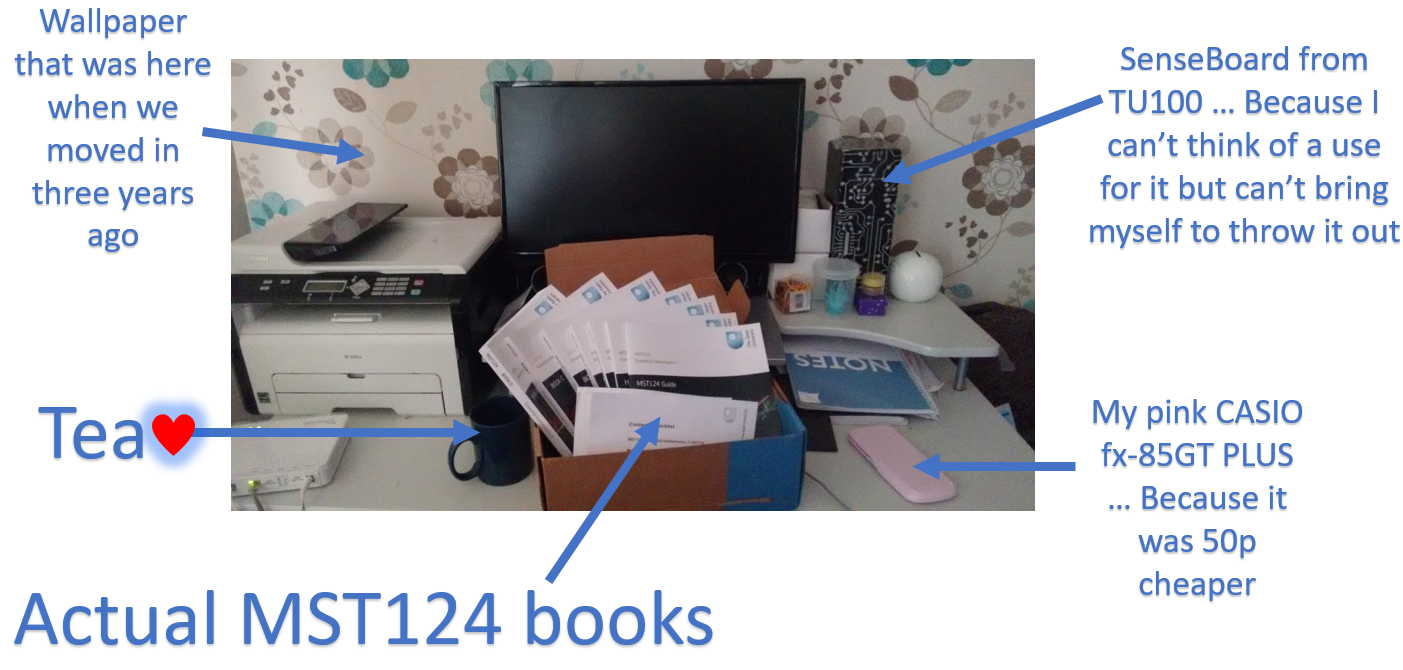Well that was earlier than expected! I didn’t expect them to ship the books for MST124 out for another two weeks, but they were waiting for me when I arrived home yesterday.
The box is heavy. My son picked up just one of the books inside and grunted under the weight. It seems to be about a quarter acre of rainforest in the box. The box contains:
- MST124 Book A
- Unit 1: Algebra
- Unit 2: Graphs and equations
- Unit 3: Functions
- MST124 Book B
- Unit 4: Trigonometry
- Unit 5: Coordinate geometry and vectors
- Unit 6: Differentiation
- MST124 Book C
- Unit 7: Differentiation methods and integration
- Unit 8: Integration methods
- Unit 9: Matrices
- MST124 Book D
- Unit 10: Sequences and series
- Unit 11: Taylor polynomials
- Unit 12: Complex numbers
- Computer Algebra Guide (about using Maxima)
- Handbook (74 page cheat-sheet you can take with you into the exam)
- MST124 Guide (as “worth while” as every other OU module guide)
- TMA form PT3 for posting assignments (Ha!)
- Specimen exam paper, new for this year
- Contents list
Here’s an “unboxing” photo with a bonus of my study area:

I had a look through the guide, the handbook, and the computer algebra guide, and then searched through they Labyrinth of Hidden OU “Support” Forums to look for anything interesting to do before the site opens.
The first thing of note was that the guide actually encourages students to start as early as possible on the material (literally as soon as they get the books, and before the site opens) and stay ahead until they’re done and it’s time to revise. Cool! Finally a module for the hares!
I downloaded and installed Maxima, and will use it as required, but as soon as the module’s over I’ll go back to doing what I used to do: WolframAlpha. Maxima basically takes the place of requiring everybody to buy an expensive graphing calculator.
Then I looked into typesetting. I have a lot of conflicting thoughts on the typesetting. The first is that during the exam, I won’t have a computer to make my work pretty, so I may want to simply practice writing it out by hand for performance sake. As I browse through the specimen paper, I don’t think this is much of a concern.
So for computer typsetting of my TMAs, I can either use LaTeX or MS Word’s equations. (Or OpenOffice, I suppose, but I’m intentionally using MS through this degree course. Another option would have been to use LibreOffice with the TexMaths LaTeX plugin.) Last night I went through the guides for both.
Going in, I thought that LaTeX would be the better solution, as everybody glows about it. It’s more work to learn, but apparently worth it in the long run. In my opinion, the long run would have to be very, very, very long indeed. It took about five times as long to learn as Word, because in addition to speaking its language for the maths, you also have to build the entire document around it. Making a decent TMA template would probably take an initial few hours to get it looking as good as Word, with researching all the required functionality. That said, if I were doing an entire maths degree, or was writing a book or thesis, it’d probably be worth the investment. It’s absolutely professional quality.
Word, however, was much easier, quicker to learn, and was just barely behind in professionalism. The only drawback was that the size of dynamic brackets wasn’t as nice as it was in LaTeX. In exchange, you get to not worry about the rest of the document, easier and more intuitive codes, the ability to avoid codes altogether and instead point-and-click, instant rendering and feedback, and the data is then extremely portable rather than locked in a PDF. If I need to write equations in another module (as I had to on every TU100 TMA) or elsewhere in life, the Word experience is also more portable. If I needed complete control and customisation, then I’d probably opt for LaTex, but don’t see that happening in my current life tragectory. It’s possibly worth it to learn the LaTeX codes, however, as they can be used in the Open University forums.
There are a few pre-module tutorials they’re running through September, and I’ll probably check one or two out, but I’m not that concerned. After the Khan Academy prep I did this summer, I’m pretty confident already with about half the module.